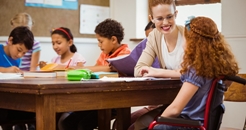 After-school clubs help poorer primary school pupils to get ahead
After-school clubs help poorer primary school pupils to get ahead
Research from Emily Tanner, Head of Children, Families & Work, Policy Research Centre, NatCen Social Research
Taking part in after-school clubs can give primary school children from poorer families a boost in academic performance and provide them with important social skills. According to a new working paper published by the Centre for Longitudinal Studies and funded by the Nuffield Foundation, after-school clubs stood out among a wide range of out of school activities as having positive benefits for young children, making the case for ongoing investment in these clubs as a way to help close the education gap.
There were around 13,400 providers of after-school clubs in England in 2013. According to the research, clubs typically fall into two categories: those that provide sport, arts or language activities for an hour at the end of the day, or less structured play clubs used to help parents with childcare.
They analysed the out-of-school activities of 6,400 children. They looked at how they changed during primary school and the patterns of activity for children from different backgrounds. They also interviewed school staff, activity providers, parents and pupils at ten primary schools in the north-east and south-east of England.
Closing the attainment gap
They found that attending after-school clubs was associated with positive outcomes for disadvantaged children. On average, they achieved a two-point higher total score in their end of primary school assessments in English, maths and science than their peers who did not attend such groups.
This equates to two-fifths of the “attainment gap” observed between poorer and more affluent children at age 11 – and also took into account their attainment when they were seven-years-old.
Looking at data from a large sample of 10,000 children, they also found positive “prosocial” outcomes – such as social skills and showing empathy towards others – for disadvantaged children who went to after school clubs. .
Easier access
Despite the evident advantages, participation in out-of-school activities such as sports clubs, music lessons and private tuition varies according to the socio-economic status of a child’s family. Children from families below the poverty line (with less than 60% of average income were much less likely to take part in these activities.
For example, at age seven, 41% of disadvantaged pupils took part in organised sports compared to 75% of more affluent children. At age 11, the gap had narrowed a little as the proportion of disadvantaged children taking part in sports rose to 61%. By age 11, 6% of disadvantaged children received music lessons paid for by their families compared to 26% of more affluent children.
After-school clubs were the only activity where access was unaffected by family circumstances – around a third of all children attended them age 11. Parents said the reasons why they sent children to after-school clubs was because they were affordable, easy to access and children were familiar with staff and knew the location.
With disadvantaged children missing out on other kinds of activities, after-school clubs provide an important way to narrow the education gap both in terms of academic attainment but also through other aspects of what could be called “character” through promoting positive social skills.
Primary school children spend a substantial proportion of their time outside of the formal school day and for many children, this provides wide-ranging opportunities for extra-curricular activities. The research shows how disadvantaged children are more likely to miss out on these opportunities because of cost, ease of access, familiarity and trust.
As schools decide how to spend the money allocated to disadvantaged pupils via the pupil premium and PE and sport premium, the research makes the case for continued use of this money to invest in school clubs.
Read article
Comments by Geoff:
As many churches provide after-school clubs, I hope you will be encouraged by these findings.
If your church is associated with a primary school, could they run after-school clubs especially for disadvantaged children?
Could your church provide such a club?
Retweet about this article:
From article-Emily Tanner NatCen Social Research, 18/05/2016